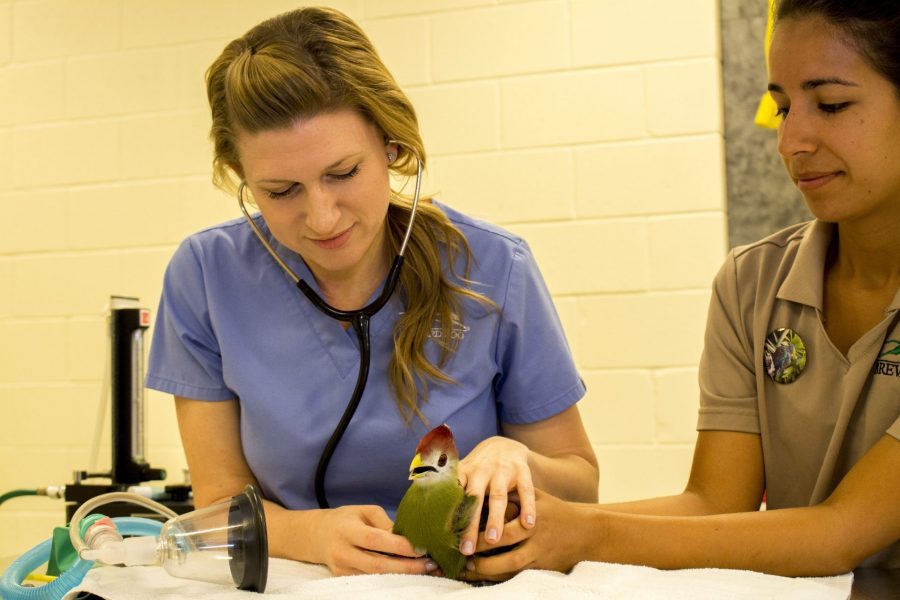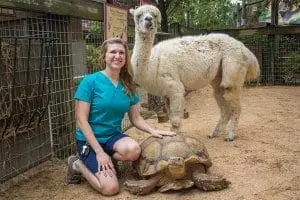

Thank you for caring for our animal residents, Kristi!
National Veterinary Technician Week is October 16-22, and we’re celebrating with profiles of the Zoo’s veterinary nurses! Each provides quality, compassionate care to the animals who call our Zoo home. Their work is critical to our mission to help wildlife thrive!
Meet Kristi, the coordinator of our L3 Harris Animal Care Center:
How long have you been with the Zoo? I started as one of the original Sea Turtle Healing Center volunteers in February 2014, then was lucky enough to become full-time staff in January 2015.
Education: I completed a completed a bachelor’s degree in psychology from the University of Central Florida, with the intention of becoming an occupational therapist. Obviously, my course changed a bit! I went back to school and obtained my Veterinary Technology degree from Purdue University and am currently completing a Master’s in Biomedical Science/Veterinary Medicine from University of Missouri.
How did you choose your field? I have always had a love for both science and wildlife but didn’t expect to find a career which would allow me to tie the two together. After I finished college, I began volunteering in sea turtle and marine mammal rehab and was hooked. Not only was it incredibly rewarding, but it opened my eyes to the amazing work veterinary staff is able to do in zoo and wildlife settings. It changed my perspective regarding the scope of the veterinary field and the role of an experienced veterinary technician.

Thank you for caring for our animal residents, Kristi!
How would you describe your work at the Zoo? My work at the zoo is a strange mix of everything. Some days, I am glued to the computer most of the day. Other days, I barely get a chance to sit down.
Leatitia and I assist veterinarians with wellness and sick exams on our zoo residents, sea turtle patients and wildlife cases. This may involve setting up, monitoring anesthesia, collecting blood and other diagnostic samples, placing IV catheters/intubating, performing dental cleanings, administering treatments and vaccines, taking radiographs, acting as a surgical tech and re-setting the room to start all over again. We also do quite a bit of lab work (bloodwork, urinalysis, cytology, fecal analysis), data entry, preparing samples for shipment, maintaining the hospital, filling prescriptions and taking care of hospitalized animals. One of my favorite activities, however, is working with zookeepers to train voluntary medical behaviors. It’s quite rewarding when a bear will present her hand for a blood draw, or an anteater will allow you to perform an ultrasound.
In addition to all of that, I coordinate our veterinary externship program, handle hospital inventory/ordering and work with outside vendors to maintain equipment and keep the hospital running as smoothly as possible.
What do you enjoy about your job? I think most people would assume that working with such unique animals is the best part of my job. While I don’t disagree, I also consider myself extremely lucky to work with such a talented and dedicated team of veterinary and animal staff here at the Zoo. The culture of Brevard Zoo, as a whole, is unlike any other I have experienced. We are all here because we want to make a positive impact in the world.
What are some challenges about your work? When you work at a zoo, each day is a bit of a surprise. There is rarely a day that goes exactly as scheduled. It’s a bit of a double-edged sword, to be honest. It certainly keeps things interesting but requires you to demonstrate quite a bit of flexibility. The zoo field is also one that requires personal sacrifice. You must be prepared to work strange hours (including weekends and holidays), come home covered in questionable smells, and push yourself mentally and physically.
What advice do you have for people who want to work in your field?
My advice to aspiring zoo veterinary technicians has two parts. I think the most important thing is to obtain a degree and take the steps to become a credentialed veterinary technician. Starting with a strong foundation of clinical skills and knowledge will allow you to better serve your patients and make you a more valuable member of your team. (Plus, higher education and licensure is an essential step toward raising the standard in our field!) The second part is to gain as much experience as possible working with non-domestic species. Most of us worked unpaid (through volunteer positions, internships, or shadowing) before finding a paid position in a zoo or aquarium. These experiences will not just boost your resume but will also help you determine if reality lines up with your expectations. I love my job but also know it may not be the right fit for everybody.
Brevard Zoo is an independent, not-for-profit organization that receives no recurring government funding for our operating costs. Your generous support enables us to continue to serve our community and continue our vital animal wellness, education and conservation programs.
